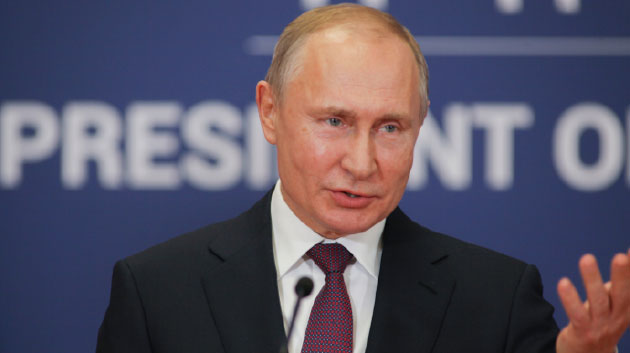Japan-Russia Peace Treaty
Negotiations Will Move Forward If Russia Can Return to the G8
Sasa Dzambic Photography / Shutterstock.com
On the 20th after his “Direct Line” Q&A session broadcast, Russian President Vladimir Putin told the press, “[Japanese PM] Shinzo – as do we all – desire the normalization of Russia-Japan relations.” Putin and Abe are scheduled to talk during the G20 summit due to be held in Osaka later this month.
Putin commented that he expects his talks with Abe to continue. “I’ve said this many times but Russia ultimately wants to normalize relations. The Japanese and Russian people are interested, and we will continue to aim towards this goal.”
At the same time, he has expressed the difficulty of coming to a resolution with the shape-shifting Peace Treaty negotiations, saying, “So many things are happening that are forcing us to postpone the final decision.” He could be referring to Japan’s unapologetic diplomatic obedience to the U.S.
Russia Sanctions Make Japan Untrustworthy
The real problem is that Russia distrusts Japan, and Japan has done nothing to remedy that. It all began in 2014 when Japan joined the U.S. and Western Europe in enforcing sanctions against Russia when it invaded Ukraine.
But the Ukraine problem was actually Russia’s reaction against the U.S. because it broke its promise and allowed Eastern European countries to join NATO.
If Ukraine joins NATO, it would give the U.S. a convenient place to deploy its missiles within range of Moscow. On top of this, 60% of the people in Crimea belong to the same ethnic group as the Russian people. The annexation of Crimea was also meant to provide protection for Russian people.
During this time, however, Japan sided with those who criticized Russia for breaking international law. They participated in sanctions against Russia and agreed to oust them from the G8. This eventually led Russia to cooperate with another country suffering under economic sanctions: China.
Prime Minister Abe has a tendency to diplomatically follow the U.S., so it is not surprising that Russia doesn’t trust him when he says he will keep U.S. military facilities out of the disputed islands.
Abe Missed His Opportunity Out of Obsession With the Islands
Last September when Putin first proposed signing an unconditional peace treaty before the year was out, Abe should have leaped at the opportunity even if it meant temporarily putting aside the territorial argument.
If he had signed the treaty and extended the Trans-Siberian Railway to Hokkaido to create a huge economic zone, he could have won back the trust that he lost in 2014. Abe’s obsession with getting the two islands back before establishing a relationship of trust with Russia was a mistake that he will pay for dearly.
Japan-Russia-U.S. Encirclement for China and North Korea
Once Russia really starts to support China, Japan will be put in an adversarial position toward both Russia and China at the same time. And then if Russia-North Korea relations are reinforced, North Korea will have its back covered, giving it confidence to aim its missiles at Japan.
In short, there is a need to separate Russia from China and North Korea, while establishing an alliance between Japan, Russia and the U.S.
Russia has been sending implied messages of this nature to Japan and the U.S. At the Putin-Kim summit in April, the Russian president demanded a final, fully verifible denuclearization of North Korea like Trump has been demanding, and avoided showing a supportive stance.
The sanctions have radically reduced Russia’s trade with the EU, which has left Putin no choice but to increase trade with China. But China’s trade war with the U.S. has left China’s economy descending into a sorry state. Instead of sharing China’s fate, Putin would surely prefer to strengthen relations with Japan and the U.S.
Help Russia Return to the G8
Japan has lost trust by cooperating in the sanctions and making many diplomatic errors. But is all hope lost for Japan to sign a peace treaty with Russia?
Master Ryuho Okawa, founder and CEO of the Happy Science Group, gave a lecture on 14th May in Makuhari Messe Chiba entitled, “The World of Freedom, Democracy and Faith.” In it, he said, “Japan should make the courageous decision to push for Russia’s return to the G8. That way we will make progress with the peace treaty.” He advocated that Japan should find any means possible to strengthen relations with Russia.
Japan-U.S.-Russia Three-Way Agreement For A Japan-Russia Peace Treaty
As to the pending problem of the territorial dispute. When he recorded the spiritual messages of Medvedev’s guardian spirit, Master Ryuho Okawa, founder and CEO of the Happy Science Group, the spirit commented
The question is, “Trump can’t you get along with Russia a bit better?” So we needs a triangle relationship between the U.S., Russia and Japan. If we succeed in improving this relationship, things will start to move forward . . . We can then form a Japan-Russia peace treaty upon a three-country agreement, and America’s back-up guarantee. That’s where we want this to go.
Russia is anxious that Japan might allow the U.S. to build military facilities on the Kuril Islands if they are returned. What Japan really needs to do is to get Trump’s official vow that such a thing won’t happen.
The Abe administration thinks that it’s Russia turn to make the next move, but actually it is Japan that needs to act. Japan’s next move could decide the fate of the Japan-Russia peace treaty.



















